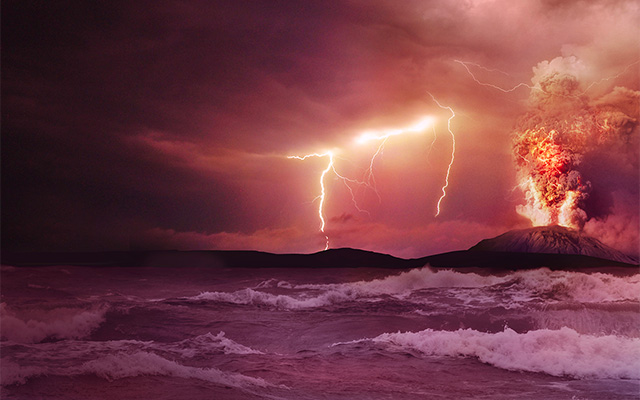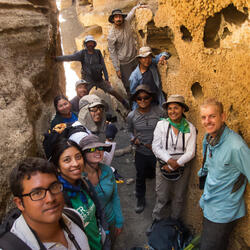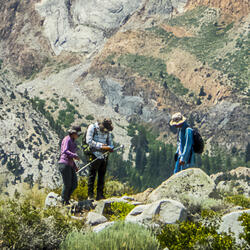Earth and Planetary Sciences is the study of the origins and evolution of the Earth and other planets in our Solar System and beyond. While there is considerable overlap with the Geology major, the Earth and Planetary Sciences major focuses more on the interconnectedness of the biosphere, oceans, and climate to promote sustainability, understand our changing Earth, and recognize our place in the Universe.
What makes Earth and Planetary Sciences unique at UCR?
Earth and Planetary Sciences is a small major at UCR, meaning that classes are also small. You will quickly get to know many of the faculty and your fellow students well. Students who are interested in gaining lab or research experience will have little difficulty in doing so.
In general, what are Earth and Planetary Sciences professors investigating?
- How have Earth’s climate, atmosphere, and oceans changed through time and how will they change into the future?
- How is the evolution of life tied to Earth’s climate history?
- How many and how diverse are exoplanets in our Universe?
- Where else could life exist in our Universe?
Why Earth and Planetary Sciences at UCR?
A key strength of the Earth and Planetary Sciences major at UCR is the wide range of potential paths that a student can take. We offer concentrations in Geosystems, Climate Change, Geobiology, Geophysics and Planetary Science, meaning that you can tailor your degree program to your particular interests.
Earth and Planetary Sciences research at UCR
- UCR Earth and Planetary Sciences professors have expertise in diverse subjects
- They study Earth’s climate extremes, the role of dust affecting climate, stability of ocean currents, and contribute to climate models used by the international community
- They examine the origin of life, its evolution, past ecosystems, and the conditions where life may exist
- Their study areas span the known Universe
What industries can I get into with an Earth and Planetary Sciences degree?
- Our goal is that Earth and Planetary Sciences majors graduate with a science-based view of the planet that can inform their future lives, along with technical skills, and skills in critical thinking and evaluation of evidence
- Such knowledge and skills can be applied to many different professions or academic disciplines
What can I do with a Earth and Planetary Sciences degree?
Recent graduates in Earth and Planetary Sciences have moved into a wide range of jobs, including positions as Asbestos Analysts, Air Quality Scientists, Environmental Scientists, Laboratory Analysts and Teachers. Several have gone on to graduate school to study topics like Hydrogeology, Education or Law.
What you should know
One thing every student interested in Earth and Planetary Sciences should consider is whether the Geology major might be a better fit for their future plans. While the Earth and Planetary Sciences major has a great many options to allow students to follow their interests, the Geology major deliberately has very few options. It has this narrow focus as it is designed to meet the State of California's requirements for gaining a professional license in Geology. Licensed professional geologists are well paid in California, and can earn tens of thousands more dollars than people doing the same work without a license. For some students, the reduced flexibility may be worth it for the better paid jobs they may be eligible for. Fortunately, for students who are wavering between the two majors, the introductory class requirements are very similar for both, and it is straightforward to switch between them!
Advice for success
Start tackling your core requirements like chemistry, math, and physics early, but also get into your first GEO course as soon as possible to meet your peers. Take the initiative and get involved! Consider joining the student-run Geology Student Organization (GSO) club and attending department events. Start exploring what interests you so you can potentially join a research lab or internship in your sophomore or junior year.
Consider this
There are so many options! If you want to understand the science behind climate change, and also how Earth's climate has varied in the past, major in Earth and Planetary Sciences and take the Climate Change concentration. If you want to study fossils and past life on Earth, major in Earth and Planetary Sciences and take the Geobiology concentration. If you want to understand the science behind detecting planets around other stars and how we know what their climates and chances of hosting life are like, major in Earth and Planetary Sciences and take the Planetary Science concentration. If you like the sound of Geology, but do not like field work, major in Earth and Planetary Sciences and take the Geosystems concentration. If you like the sound of Geophysics, but do not want to take advanced math and physics classes, major in Earth and Planetary Sciences and take the Geophysics concentration.
Available Minors in Earth and Planetary Sciences
Global Climate Change Minor
Planetary Sciences Minor




